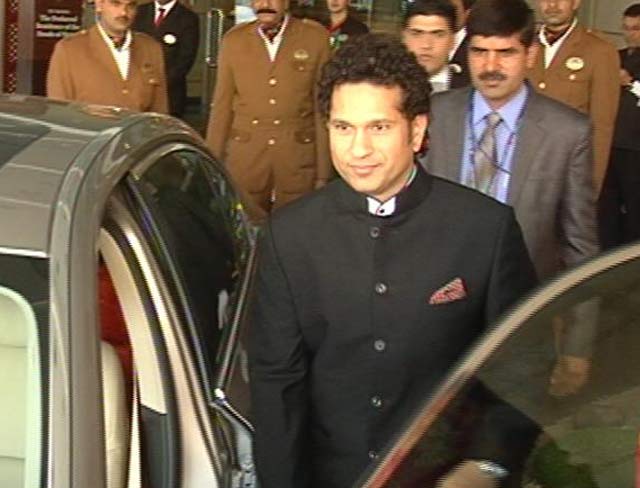Sachin Tendulkar awarded with Bharat Ratna, India's highest civilian award
Sachin Tendulkar beat hockey wizard the late Dhyan Chand to become the first sportsperson to receive the Bharat Ratna
- Written by Soumitra Bose
- Updated: February 04, 2014 08:01 pm IST
On a sunny Tuesday, Lutyens' Delhi had two international sports celebrities with separate agendas. While golf superstar Tiger Woods, on a hurricane private corporate tour, was scorching one green to another at the Delhi Golf Club, not so far away, the darling of a billion Indians, Sachin Tendulkar, was breaking another 'record'. The retired cricketing genius became the first sportsperson to be bestowed the Bharat Ratna, India's highest civilian award, by President Pranab Mukherjee at Rashtrapati Bhavan. (Highlights of the event) At 40, Tendulkar, dressed in a black bandhgala and accompanied by his wife Anjali and daughter Sarah, became the youngest recipient of the Bharat Ratna. Tendulkar, who retired from all forms of international cricket in November last year, beat legendary hockey wizard the late Dhyan Chand to the highest civilian honour of India. The Bharat Ratna was also given to eminent scientist Professor CNR Rao as well on Tuesday. Professor Rao is exactly double of Tendulkar's age. (Also see pics: Sachin's 24-year journey in world cricket | Sachin's greatest achievements)
At 40, Tendulkar, dressed in a black bandhgala and accompanied by his wife Anjali and daughter Sarah, became the youngest recipient of the Bharat Ratna. Tendulkar, who retired from all forms of international cricket in November last year, beat legendary hockey wizard the late Dhyan Chand to the highest civilian honour of India. The Bharat Ratna was also given to eminent scientist Professor CNR Rao as well on Tuesday. Professor Rao is exactly double of Tendulkar's age. (Also see pics: Sachin's 24-year journey in world cricket | Sachin's greatest achievements) The decoration, conferred "for performance of highest order in any field of human endeavour," is in the form of a peepal leaf, about 5.8 cm long, 4.7 cm wide and 3.1 mm thick. It is of toned bronze. On its obverse is embossed a replica of the sun, 1.6 cm in diameter, below which the words Bharat Ratna are embossed in Devanagari script. On the reverse are State emblem and the motto, also in Devanagari. The emblem, the sun and the rim are of platinum. The inscriptions are in burnished bronze. The award does not carry a monetary grant. (Also see: All the pics from the ceremony)
The decoration, conferred "for performance of highest order in any field of human endeavour," is in the form of a peepal leaf, about 5.8 cm long, 4.7 cm wide and 3.1 mm thick. It is of toned bronze. On its obverse is embossed a replica of the sun, 1.6 cm in diameter, below which the words Bharat Ratna are embossed in Devanagari script. On the reverse are State emblem and the motto, also in Devanagari. The emblem, the sun and the rim are of platinum. The inscriptions are in burnished bronze. The award does not carry a monetary grant. (Also see: All the pics from the ceremony)
Tendulkar's name was recommended by the Prime Minister's Office. The PMO had sought information on Tendulkar from the sports ministry on November 14, the first day of his farewell Test at Mumbai's Wankhede Stadium. Two days later, a formal announcement was made after formalities involving the Prime Minister and President were completed. (Read full report here)
A day after he retired from Test cricket, Tendulkar dedicated the Bharat Ratna "to all mothers of India." Initially, he had dedicated the Bharat Ratna to his mother, Rajni. On November 17, Tendulkar said at a press conference in Mumbai: "There are millions and millions of mothers in India who sacrifice many things for their children. I would like to share my award with them."  Tendulkar said that he was humbled and honoured to receive the Bharat Ratna. He also congratulated fellow recipient Prof Rao. "I would like to congratulate Prof CNR Rao for getting the Bharat Ratna. It is an honour to get the award with him, his contribution to the field of science is immense. It's only that cricket is played in front of thousands of people and is a popular field," he said.
Tendulkar said that he was humbled and honoured to receive the Bharat Ratna. He also congratulated fellow recipient Prof Rao. "I would like to congratulate Prof CNR Rao for getting the Bharat Ratna. It is an honour to get the award with him, his contribution to the field of science is immense. It's only that cricket is played in front of thousands of people and is a popular field," he said.
To say merely that cricket is India's most popular sport would be a vast understatement. Cricket stars smile on seemingly every billboard and television commercial, Tendulkar prominently among them. While soccer has long since taken over as the top sport in England, cricket's birthplace, in India the nation's sporting self-image is tied resolutely to its national cricket team.
Much of Tendulkar's greatness comes from the fact that he consistently fulfilled those expectations. Few players have left so comprehensive or so potentially enduring a mark in the record books. Simply put, Tendulkar was the greatest batsman of his generation, with every kind of shot in his arsenal, from conventional drives and punches to improvised strokes that could take the breath away.
He is the first man to play 200 five-day Test matches, and he played more one-day international games, 463, than anyone else. He is the highest career run scorer - 15,847 in Tests and 18,426 in one-days -- in both formats. He has also scored 100 or more runs more often than anyone else in both formats, with 51 in Tests and 49 in one-days, giving him a neat and unprecedented 100 centuries in international cricket.
(With agency inputs)
